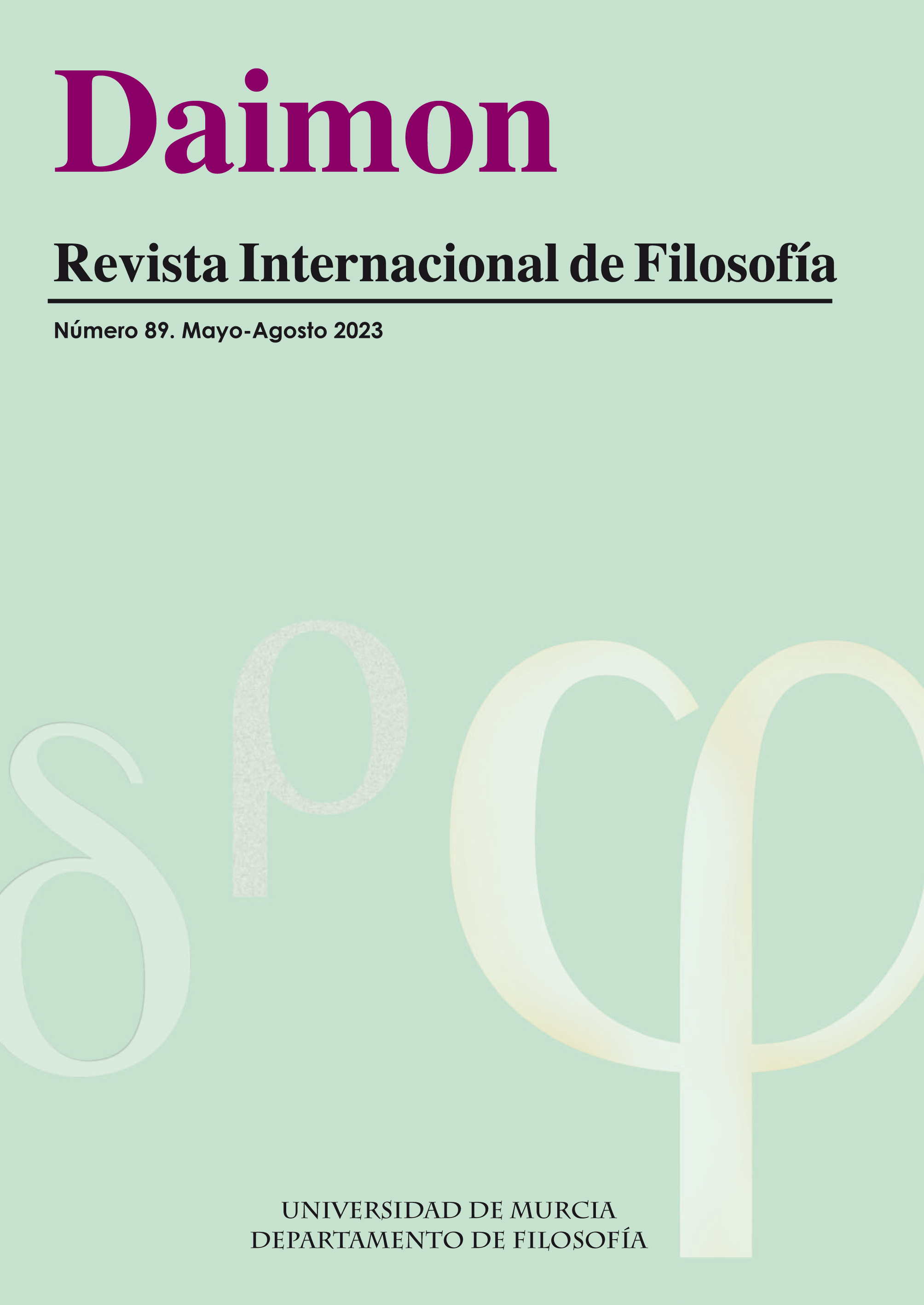Immortality and Indestructibility on Leibniz. Critical Lecture of the §89, I, of his Essais de Théodicée
Abstract
According to Leibniz’s monadological ontology, to say that every living being is imperishable implies that death does not exist in strict sense, or rather that death is only apparent. Leibniz is not only going to argue that monads cannot perish by natural means, but also that what we use to call death does not imply the separation of body and soul. In this research work, I intend to make a critical commentary of §89, I of his Essais de Théodicée, one of the emblematic passages in which the Hanoverian develops the distinction between two kinds of subsistence.
Downloads
-
Abstract699
-
PDF (Español (España))410
-
HTML (Español (España))352
References
Barth, C. (2011). “Leibnitian Conscientia and its Cartesian Roots”, en: Studia Leibnitiana, 43 (2), pp. 216-236.
Escribano, M. (2017). Complejidad y dinámica en Leibniz. Un vitalismo ilustrado, en Nova Leibniz 8, Granada: Comares.
Fazio, R.E. (2018). “La noción de cuerpo en los escritos maduros de Leibniz”, en: Dianoia, vol. LXIII, no. 80, pp. 29-52.
Jorgensen, L.M. (2011). “Leibniz on Memory and Consciousness”, en: British Journal for the History of Philosophy, 19 (5), p. 887-916.
Kulstad, M. (1981). “Leibniz, Animals, and Apperception”, en: Studia Leibnitiana, 13(1), pp. 25-60.
Leibniz, G.W. (1965). Die Philosophischen Schriften, herausgegeben von C.I. Gerhardt, Hildesheim.
Leibniz, GW. (1997). G. W. Leibniz, Der Briefwechsel mit Antoine Arnauld, ed. de Finster, R., Felix Meiner Verlag, Hamburg.
Leibniz, G.W. (2010). G.W. Leibniz. Obras filosóficas y científicas. 2. Metafísica. Editor: González, A.L., Granada: Comares.
Leibniz, G.W. (2009). G. W. Leibniz. Obras filosóficas y científicas. 8. Escritos científicos, ed. Arana, J., Granada: Comares.
Leibniz, G.W. (2012). G. W. Leibniz. Obras filosóficas y científicas. 10. Ensayos de Teodicea, ed. Guillén Vera, T., Granada: Comares.
Leibniz, G.W. (2007). G. W. Leibniz. Obras filosóficas y científicas. 14. Correspondencia I, eds. Nicolás, J.A., Ramón Cubells, M., Granada: Comares.
Leibniz, G.W. (2011). G. W. Leibniz. Obras filosóficas y científicas. 16 A. Correspondencia III, ed. Orio de Miguel, B., Granada: Comares.
Leibniz, G.W. (2011). G. W. Leibniz. Obras filosóficas y científicas. 16 B. Correspondencia III, ed. Orio de Miguel, B., Granada: Comares.
Leibniz, G.W. (2016). G. W. Leibniz. Obras filosóficas y científicas. 18. Correspondencia V, ed. Rada, E., Granada: Comares.
Leibniz, G.W. (1768). G. G. Leibnitii Opera Omnia, L. Dutens (ed.), 6 vols, Ginebra.
Leibniz, G.W. (1992). Nuevos ensayos sobre el entendimiento humano, trad. Echeverría, J., Madrid: Alianza.
Leibniz, G.W. (2014). Methodus Vitae (Escritos de Leibniz). Vol. II: Individuo o mónada, trad. Andreu, A., Madrid: Plaza y Valdés.
Leibniz, G.W. (2014). Methodus Vitae (Escritos de Leibniz). Vol. III: Ética o política, trad. Andreu, A., Madrid: Plaza y Valdés.
Leibniz, G.W. (1961). Opuscules et fragmentes inédits de Leibniz. Extraits des manuscrits de la Bibliothèque royale de Hanovre, par L. Couturat, Hildesheim.
Leibniz, G.W. (1923). Sämtliche Schriften und Briefe, von der Deutschen Akademie der Wissenschaften zu Berlin, Darmstadt (1923 y ss.), Leipzig (1938 y ss.), Berlín (1950 y ss.).
Leibniz, G.W. (1948). G. W. Leibniz: Textes inédits d`après les manuscrits de la bibliothèque provinciale de Hanovre, G. Grua (ed.), 2 vols., París (reimp. PUF, 1998).
Leibniz, G.W. (1954). Principes de la nature et de la grâce fondés en raison. Principes de la philosophie ou monadologie, publiés intégralement d’après des lettres inédites par Robinet, A., París.
Leibniz, G.W. (1948). Textes inédits d’après les manuscrites de la bibliothèque proviciale de Hannovre, publiés et annotés par G. Grua, Paris.
McRae, R. (1978). Leibniz: Perception, Apperception and Thought, Toronto: Toronto University Press.
Nicolás, J.A. (2011a). “Dimensión vitalista de la ontología leibniziana”, en: Nicolás, J. A.; Toledo, S. (eds.), Leibniz y las ciencias empíricas, Granada: Comares, pp. 71-91.
Nicolás, J.A. (2011b). “Leibniz en el difícil nacimiento de las ciencias”, en: Nicolás, J. A.; Toledo, S. (eds.), Leibniz y las ciencias empíricas, Granada: Comares, pp. 1-14.
Olesti, J. (2018). “Morir, dormir, tal vez soñar… Sobre un eco leibniziano en Diderot”, en: Isegoría. Revista de Filosofía Moral y Política, no. 58, pp. 39-53.
Phemister, P. (2005). Leibniz and the Natural World. Activity, Passivity and the Corporeal Substance, Springer: Dordrecht.
Phemister, P. (2011). “Monads and Machines”, en: Smith, J.E.H., Nachtomy, O. (eds.), Machines of Nature and Corporeal Substances in Leibniz, Dordrecht: Springer, pp. 67-111.
Rodero, S. (2019). “G.W. Leibniz: de la biología a la metafísica. La respuesta vitalista de Leibniz: una ontología unificada”, en: Episteme, vol. 29, no. 1, pp. 98-110.
Roinila, M. (2016). “The “Death” of Monads: G.W. Leibniz on Death and Anti-Death”, en: Tandy, C. (ed.), Death and Anti Death, vol. 14: Four Decades after Michael Polanyi, Three Centuries after G.W. Leibniz, Ann Arbor: RIA University Press, pp. 243-266.
Copyright (c) 2023 Daimon Revista Internacional de Filosofia

This work is licensed under a Creative Commons Attribution-NonCommercial-NoDerivatives 3.0 Unported License.
Las obras que se publican en esta revista están sujetas a los siguientes términos:
1. El Servicio de Publicaciones de la Universidad de Murcia (la editorial) conserva los derechos patrimoniales (copyright) de las obras publicadas, y favorece y permite la reutilización de las mismas bajo la licencia de uso indicada en el punto 2.
2. Las obras se publican en la edición electrónica de la revista bajo una licencia Creative Commons Reconocimiento-NoComercial-SinObraDerivada 3.0 España (texto legal). Se pueden copiar, usar, difundir, transmitir y exponer públicamente, siempre que: i) se cite la autoría y la fuente original de su publicación (revista, editorial y URL de la obra); ii) no se usen para fines comerciales; iii) si remezcla, transforma o crea a partir del material, no podrá distribuir el material modificado.
3. Condiciones de auto-archivo. Se permite y se anima a los autores a difundir electrónicamente las versiones pre-print (versión antes de ser evaluada) y/o post-print (versión evaluada y aceptada para su publicación) de sus obras antes de su publicación, ya que favorece su circulación y difusión más temprana y con ello un posible aumento en su citación y alcance entre la comunidad académica. Color RoMEO: verde.











